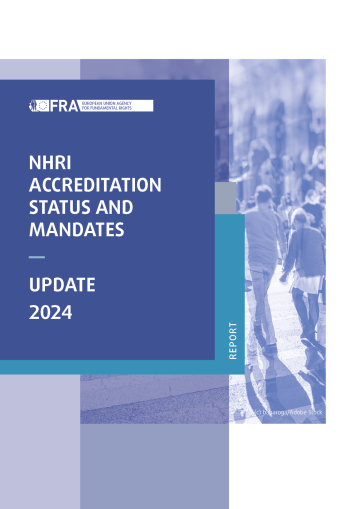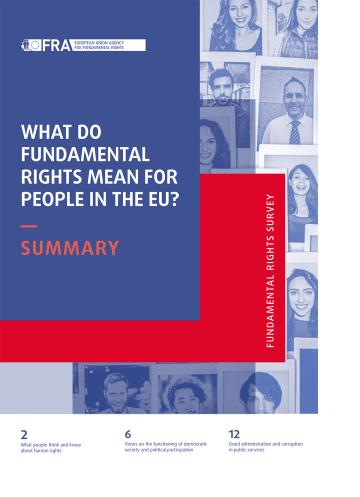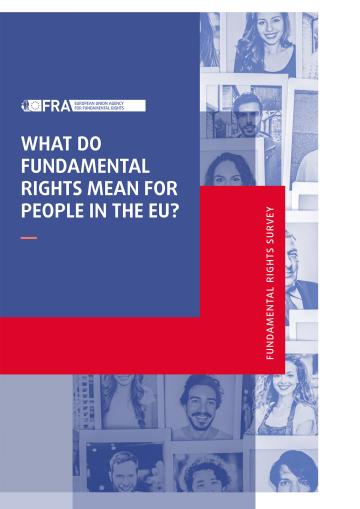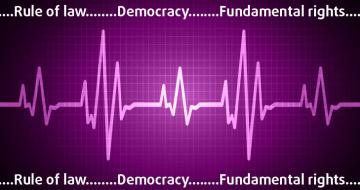This report is based on research FRA conducted in 2022 and 2023 through its multidisciplinary research network Franet [220]
FRA (2023), ‘FRANET’.
and through interviews and meetings at both national and EU levels. Researchers were asked to focus on the eight funds covered by the CPR 21–27. In total, 92 interviews were conducted for this report at international, EU, national and local levels.
At EU level, FRA’s Franet partner conducted desk research and semi-structured interviews with six officials from the Commission (from the Directorates-General for Employment, Social Affairs and Inclusion; for Regional and Urban Policy; for Justice and Consumers; and for Migration and Home Affairs), five representatives from EU-level CSOs, three representatives of independent fundamental rights bodies (or their umbrella organisations), one academic, a representative of EIGE and a representative of the European Ombudsman.
The selection of Member States covered by the Franet research was based on Member States with an A-status accredited NHRI to ensure that FRA could hear from fully independent institutions in these countries (i.e. an NHRI that, according to the Sub-Committee on Accreditation of the Global Alliance of NHRIs, is independent in law, membership, operations, policy and control of resources). The selection among the countries having an A-status accredited NHRI was based on their level of relative per capita funding from EU funds and a reasonable geographical balance.
At national level, Franet partners in Bulgaria, Croatia, Estonia, Finland, France, Germany and Portugal carried out desk research and semi-structured interviews with representatives from government, civil society, independent fundamental rights bodies and academia.
- In Bulgaria, representatives of the Ministry of Labour and Social Policy, the Ministry of Regional Development and Public Works, the Commission for Protection against Discrimination, the Ombudsman and three CSOs were interviewed.
- In Croatia, Franet partners spoke to representatives of three CSOs, one academic and representatives of the Office for the Cooperation with the Civil Society, the National Foundation for Civil Society Development, the Ministry of Labour, the Ministry for Regional Development and EU Funds, the Office of the Ombudsperson, the Government Office for Human Rights and Rights of National Minorities, the Ombudsperson for Gender Equality and the Office of the Ombudsperson for Persons with Disabilities.
- In Estonia, interviews were conducted with representatives of the Ministries of Finance, Social Affairs and Interior and of the State Shared Service Centre, as well as with representatives of the Chancellor of Justice, the Gender Equality and Equal Treatment Commissioner and representatives of four CSOs.
- In Finland, representatives from the Interior Ministry, the Ministry of Economic Affairs and Employment, and the Centre for Economic Development, Transport and the Environment were interviewed, together with four representatives of national bodies with a human rights remit, two academics and one civil society representative.
- In France, interviews were conducted with two academics and representatives of three CSOs, the Interior Ministry, the Authority for the Audit of European Funds in France, a managing authority and the French National Consultative Commission on Human Rights and the Public Defender of Rights.
- In Germany, representatives of three CSOs, one academic, representatives of three managing authorities, two representatives of the German Institute for Human Rights (one working on disability rights) and a representative of the Federal Foundation for Gender Equality were interviewed.
- In Portugal, representatives of two CSOs, two academics and representatives of the National Monitoring Mechanism for the Implementation of the Convention on the Rights of Persons with Disabilities, of the Commission for Citizenship and Gender Equality, of the High Commission for Migration and of the programmes ‘Social Inclusion and Employment’, ‘Human Capital’ and ‘Sustainability and Efficient Use of Resources’ were interviewed.
Seven roundtables were also organised by Franet partners to allow for an exchange of views on EU funds and fundamental rights between actors from different backgrounds.
- In Bulgaria, this roundtable brought together a representative of a managing authority, representatives of the national equality body and representatives of civil society working in the fields of child-related and housing policies (both part of monitoring committees).
- In Croatia, the roundtable brought together representatives of the Ministry of Regional Development and EU Funds; the Government Office for Cooperation with NGOs; the Ministry of Labour, Pension System, Family and Social Policy; the Office of the Ombudsperson; and the Office of the Ombudsperson for Persons with Disabilities, as well as five civil society representatives.
- In Finland, participants were from the Ministry of the Interior, the Ministry of Economic Affairs and Employment, two independent fundamental rights bodies and a CSO.
- In France, the roundtable brought together three representatives of national bodies with a human rights remit, representatives of the Interior Ministry and a national agency dealing with EU funds, three academics and two civil society representatives.
- In Germany, the roundtable brought together three representatives of civil society, one academic, five representatives of the NHRI and two fund managers. In Estonia, the roundtable featured two representatives from a governmental body dealing with EU funds (the State Shared Service Centre), representatives of the Ministries of Finance and Social Affairs and two CSOs.
- In Portugal, the roundtable brought together representatives from the High Commission for Migration, the Commission for Citizenship and Gender Equality, the Commission for Equality on Work and Employment, two CSOs and two representatives of national fund managers of operational programmes.
FRA also organised an EU-level civil society workshop with representatives from civil society umbrella organisations with support from the Commission. The resulting report is as an additional basis of information for this report.
All interviews and the workshop led to seven reports drafted by the agency’s Franet partners reflecting the situation in Bulgaria, Croatia, Estonia, Finland, France, Germany and Portugal, as well as a report analysing the interviews done at EU level. Additional evidence was provided via desk research.
Reports regarding the work of the NHRIs in Croatia, Cyprus, Latvia, Poland and Slovakia were also published under the European Economic Area (EEA) and Norway Grants Fund for Regional Cooperation project ‘Supporting national human rights institutions in monitoring fundamental rights and the fundamental rights aspects of the rule of law’, which FRA leads. Moreover, information from a project on EU fundamental rights in practice and the Charter enabling condition in Greece under the EEA Grants, in which FRA acts as partner of the Greek Ombudsman, fed into this report. The project is titled ‘Greek Ombudsman actions for strengthening good governance, accountability and combating maladministration in the public sector’. Finally, the report also builds on evidence from previous FRA work in this area.














